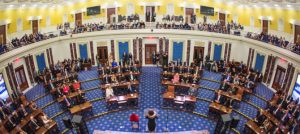
Members of the Senate Select Committee on Intelligence have upped the ante in regards to the disclosure of information regarding recovered UAP craft and materials by requiring those working on these exotic projects to not only disclose what they know about recovery and back-engineering efforts on UAPs, but also to make the associated material available for review by the All-domain Anomaly Resolution Office (AARO). While the new provisions have yet to be passed into law, they were unanimously approved by the Committee in a 17-0 vote.
Included as part of the Intelligence Authorization Act (IAA) FY2024, the provisions, laid out in Section 1104, “Funding Limitations Relating to Unidentified Anomalous Phenomena”, require individuals that are “currently or formerly under contract with the Federal Government that has in their possession material or information provided by or derived from the Federal Government relating to unidentified anomalous phenomena” to disclose the information on the existence of the materials in their possession to the Director of AARO, currently Dr. Sean Kirkpatrick, regardless of whether or not the material is “protected by any form of special access or restricted access.”
There are also strict deadlines set regarding the disclosure of this material, requiring those affected to inform AARO about what they know or have in their possession within 60 days of the enactment of the IAA, and to make “all such material and information” “available to the Director for assessment, analysis, and inspection” within 180 days, including “a comprehensive list of all non-earth origin or exotic unidentified anomalous phenomena material.”
The language of the IAA appears to have been crafted to be as comprehensive as possible, in order to allow as little wiggle room as possible for loopholes that might allow those looking to duck responsibility on these matters to do so; for instance, activities considered to be subject to this order would include ancillary roles such as “recruiting, employing, training, equipping, and operations of, and providing security for” operations focused on “capturing, recovering, and securing unidentified anomalous phenomena craft or pieces and components of such craft.”
Individuals involved in reverse engineering efforts involving UAP materials are also subject to the provisions, regardless of what aspect of the research involved might be, and even activities aimed at maintaining the cover-up are not considered sacred, with the IAA calling on individuals involved in “managing and providing security for protecting activities and information relating to unidentified anomalous phenomena from disclosure or compromise” to step forward with what they know.
As the IAA has yet to be passed into law, the clock for the deadlines outlined in it are not currently ticking, and the Act still needs to be approved by Congress and the Senate before it can be enacted. If the IAA is signed into law as worded, anyone involved in UAP crash/retrieval and research will have to disclose what they know, or risk losing government funding for those operations.
“It’s been approved by the Senate intelligence committee; obviously it would have to pass the full Senate, then it has to pass the House, then President Biden would have to sign it; are any of those things going to happen?” investigative reporter George Knapp asked on The End of UFO Secrecy? episode of “Weaponized”.
Knapp has been involved in investigating the cloak of secrecy that has shrouded the government’s involvement with UFOs since 1989 when he interviewed whistleblower Robert Lazar about his experience with a secret UFO back-engineering project at S-4, a location adjacent to Area 51.
“You know it looks pretty good right now, but I would say it’s not a slam dunk at all,” Knapp cautions: “the Pentagon has enormous power on Capitol Hill,” and along with the defense contractors that are involved—all of whom would become subject to Congressional and Senate oversight after decades of unrestricted research activities—have a powerful lobbying presence in government, and are likely to mount a significant pushback effort against the Committee’s demands.
It’s important to bear in mind that the IAA’s call for accountability doesn’t mean that the Committee is looking to put an end to such research and retrieval efforts; rather, they are looking to bring some form of government oversight to black projects that have operated in the shadows for decades. Indeed, the text of the IAA states that “the United States industrial base must retain its global lead in critical advanced technologies” and that the government “must expand awareness about any historical exotic technology antecedents previously provided by the Federal Government for research and development purposes.”
Subscribers, to watch the subscriber version of the video, first log in then click on Dreamland Subscriber-Only Video Podcast link.
The show must go on.
Poor Americans.
I can only think, “Good luck with that….”